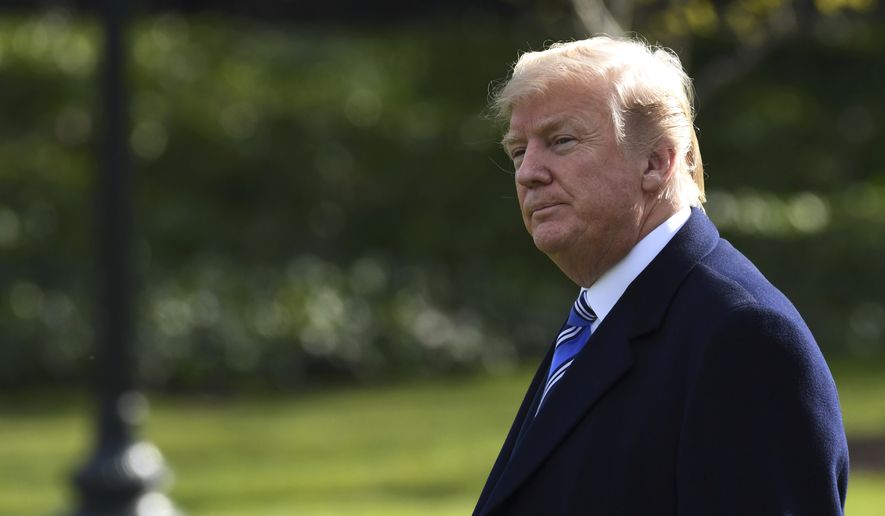OPINION:
Who says Donald Trump can’t get tough with Russians? The president’s order on Monday to send 60 Russian “diplomats” home, joining Canada, Poland, Italy, Denmark, France and Germany among other European nations, is welcome solidarity with Britain. It’s in answer to the poisoning of a onetime Russian spy and his daughter as they sat on a public bench March 4 in the English provincial town of Salisbury. Britain had earlier expelled 23 “diplomats.”
The president’s order includes 12 people identified as “intelligence agents” at the Russian mission at the United Nations. “Intelligence agent” is the diplomatic word for “spy,” typically listed as an “agricultural officer” or “cultural officer,” but who wouldn’t know the difference between a rutabaga and a carrot, or between grand opera and the Grand Ole Opry.
The replacements will be spies, too, but the gesture is needed evidence that America and the West, including President Trump, are finally recognizing that the Cold War has officially resumed. Mr. Trump has additionally ordered the Russians to close their consulate in Seattle, which has ready access to a U.S. Navy base and the vast aircraft manufacturing facilities at Boeing. Perception, as we say in Washington, is reality.
White House officials, in a call to reporters, said the expulsions were part of a determined effort to “root out” Russians who have been “actively” spying against U.S. intelligence operations, and the 60 Russian operatives were told to pack their clothes, pots, pans, children and pets and get out within seven days.
Sergei Skripal, 66, a onetime Russian spy and a double agent who had also done work for the allies, and his daughter, Yulia Skripal, 33, were poisoned with what is believed to have been weapons-grade novichok, for which there is no known antidote. They have been in a coma in a hospital in Salisbury, close to death, since. A policeman who went to their assistance when they were discovered, foaming at the mouth, was sent to hospital, too, and has since been released, though not yet fully recovered.
The reaction of the allies had been under close and co-ordinated planning since British Prime Minister Theresa May took a hard line toward the Russians after the poisonings. President Trump had had several conversations with her, and hinted March 15 that something dramatic was in the works. “We are in deep discussions,” the president said. “A very sad situation. It certainly looks like the Russians were behind it. Something that should never, ever, happen. We’re taking it very seriously, as I think are many others.”
Voices in the Trump administration were raised early in support of Mrs. May and her government. Rex Tillerson, who was then secretary of State, said he supported the British “assessment that Russia was likely responsible for the nerve-agent attack that took place in Salisbury,” and he was joined the following day by Mr. Trump’s statement that Russia was likely responsible. The day after that Nikki Haley, the U.S. ambassador to the United Nations, said the United States “believes that Russia is responsible for the attack using a military-grade nerve agent.”
The Russians have denied everything, as they always do, and President Vladimir Putin has shed tears and sympathetic words. “[The Skripal case] was a tragic situation but we don’t have any information on what could have led to this,” his press spokesman says. “Moscow is always ready to co-operate.”
Bill Browder, an American businessman who has clashed with Mr. Putin for years and whom the Russian president regards as “a public enemy,” says the Russians were sending a message to defectors and other Russians in the West, that “if you are disloyal and betray [Russia] it doesn’t matter when you did it, and it doesn’t matter where you flee to, we’ll come and get you and kill your family, too.”
This should be taken as a message to Americans, too, including the president. Vladimir Putin was trained, and trained well, by the old KGB, and he remembers everything he learned in the arts of anything-goes spying, cruelty and death. The Cold War, which the West wanted to believe ended with the collapse of the Soviet Union, has resumed with all the urgency and fervor the world knows only too well.
The voices of those who cry “peace, peace when there is no peace” have resumed, too. It’s a mark of the kind, the compassionate and the peaceful to think that all the evil-doers of the world need for reform is a little sip of the milk of human kindness. This is the chorus of the willfully foolish that greeted the appointment of John Bolton as the new national-security adviser to President Trump. The president will need advice with the bark on in the days ahead. The Cold War is back.




Please read our comment policy before commenting.